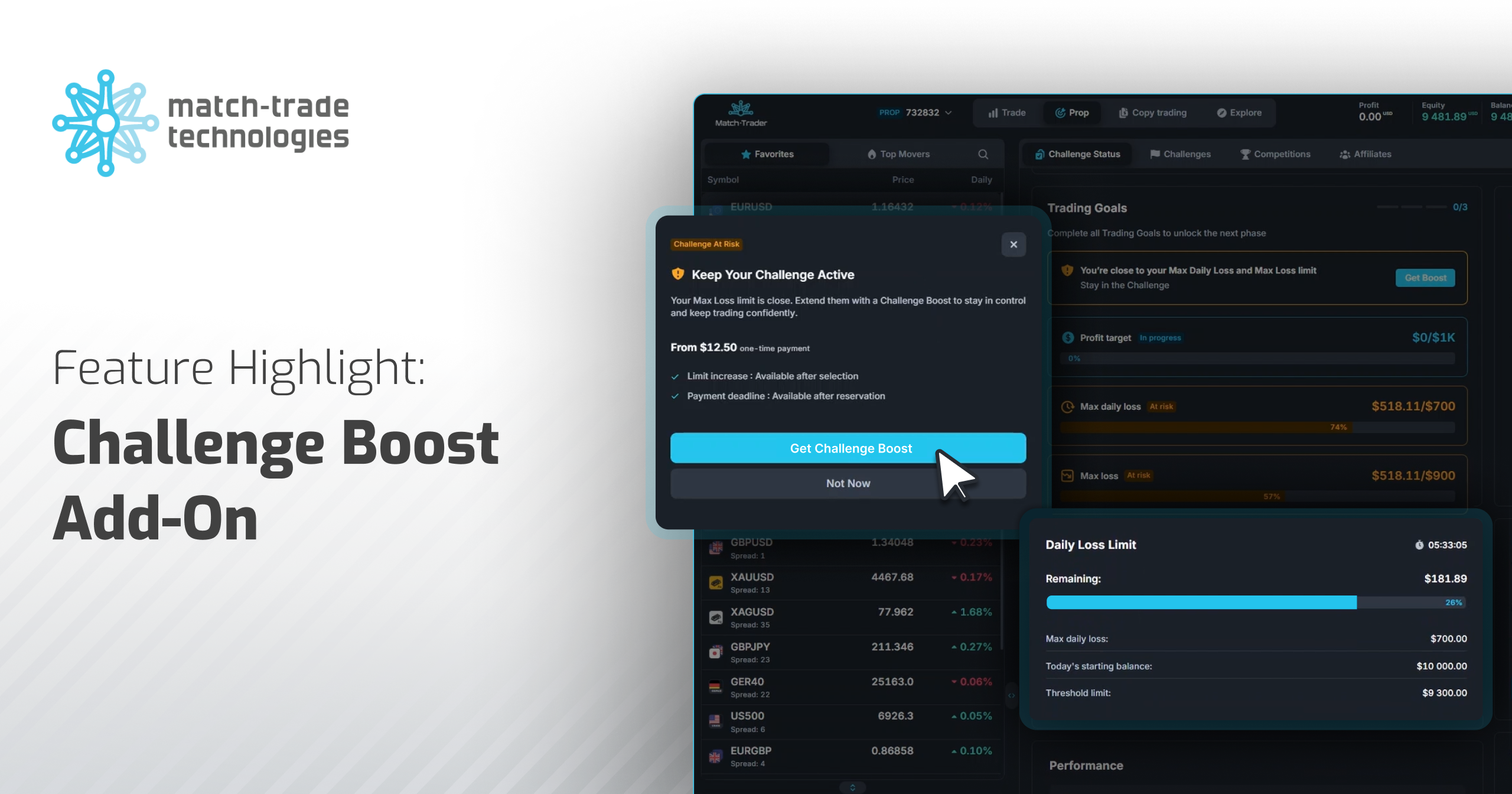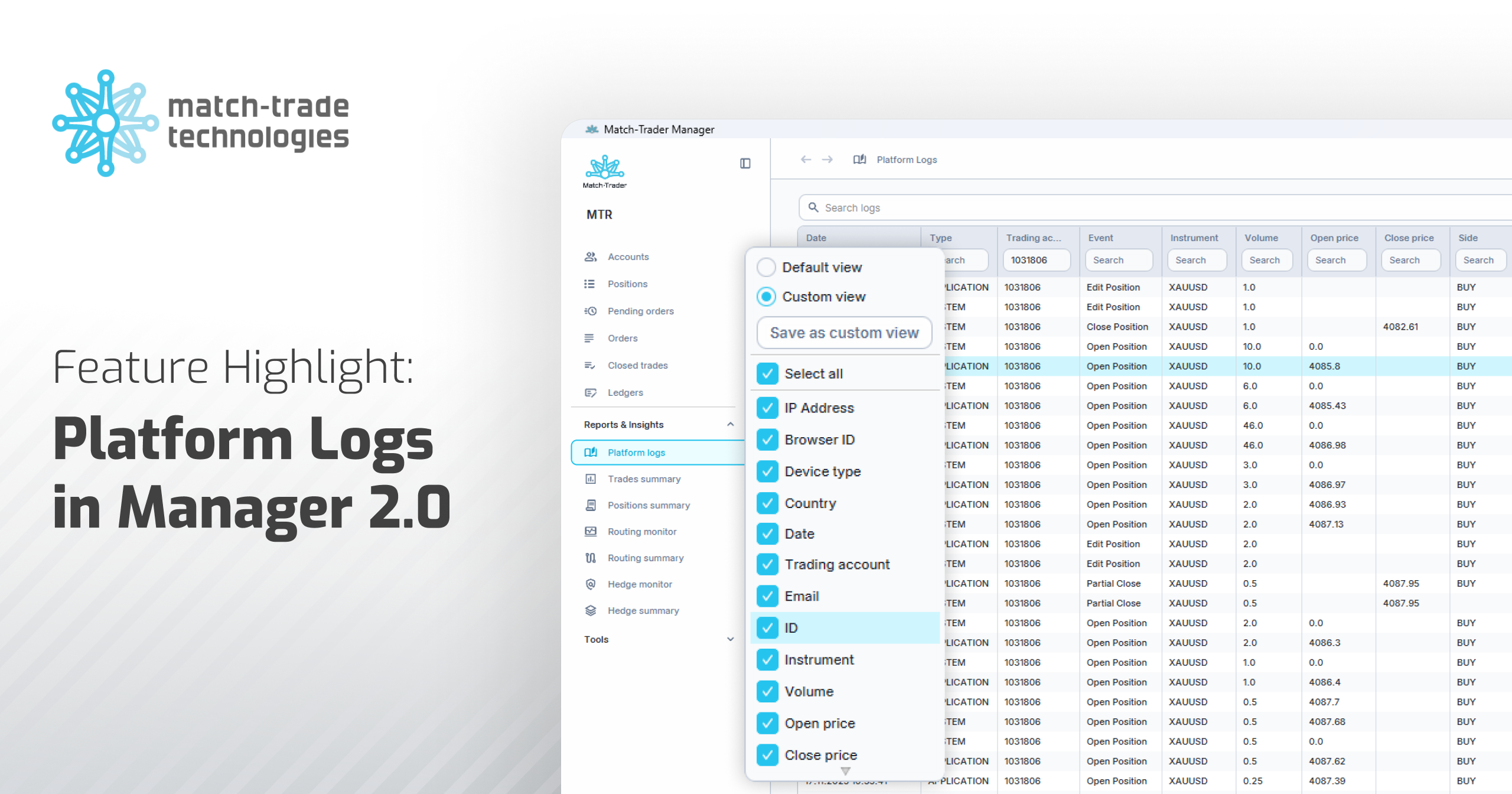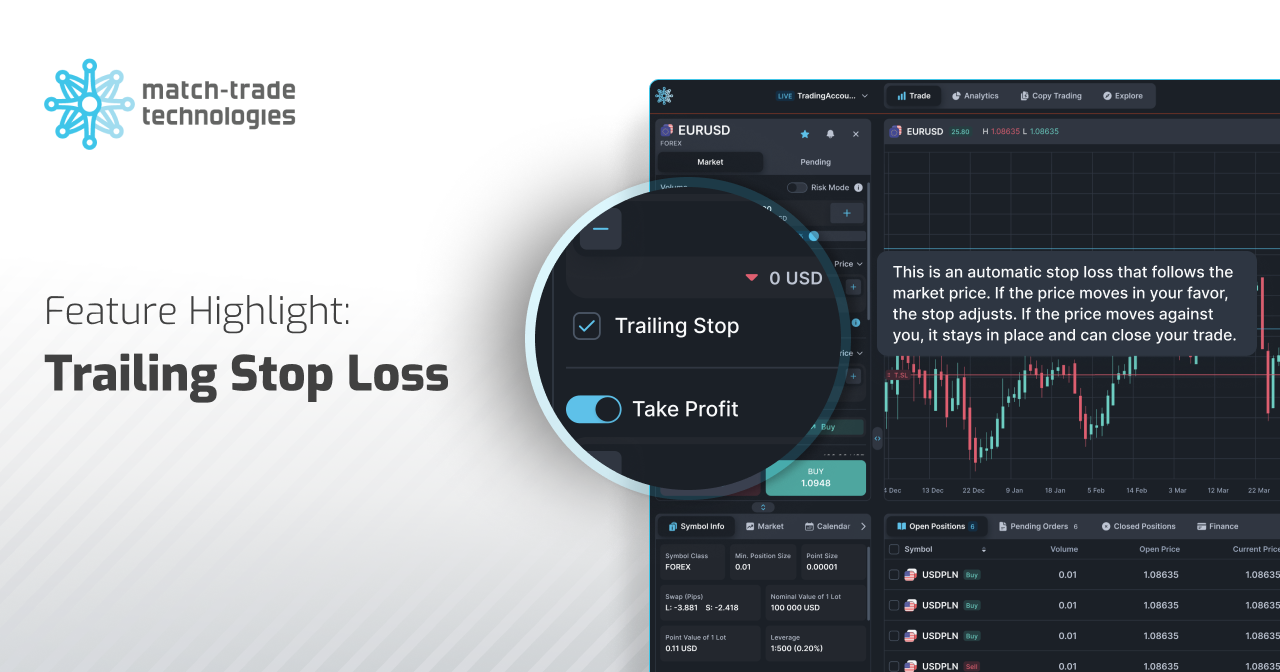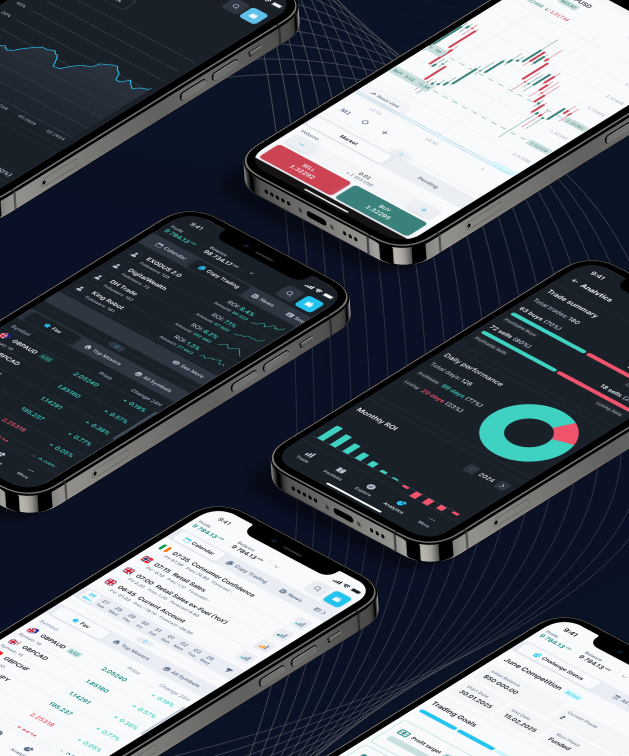Our January release introduces significant enhancements across our ecosystem, focusing on usability, efficiency and expanded functionality. The Match2Pay dashboard has been refined with a more intuitive design, making financial management smoother, while the platform’s cryptocurrency portfolio now supports additional assets. Match-Trader users will benefit from improved sorting, filtering and global search capabilities, along with key upgrades to the prop trading system. Additionally, new advanced account management features offer greater control over trading operations, ensuring a more seamless experience for both brokers and traders.
Highly Intuitive Crypto Dashboard
We’ve refreshed the Match2Pay dashboard, making it more intuitive and user-friendly. The new design resembles a cryptocurrency wallet, simplifying platform usage.
The introduced changes enable clients to:
- Top up their balance directly from the dashboard using the selected cryptocurrency gateway.
- Make withdrawals from the specified balances to external cryptocurrency addresses.
To facilitate transaction analysis, we’ve added two separate tabs:
- Cryptocurrency transactions and generated crypto addresses.
- Transactions processed through external PSPs.
Additionally, new analytical features have been added to the “Balance” tab:
- A pie chart displaying the percentage distribution of the Match2Pay balance across different currencies.
- A line graph illustrating balance changes in the selected currency over the last 30 days.
Benefits:
- Simple operation: A modern, intuitive interface makes the platform easy to use, especially for cryptocurrency users.
- Complete financial control: It’s possible to quickly top up the balance and process withdrawals without the need for additional tools.
- Better data organisation: Transaction division by payment method simplifies analysis and review.
- Instant access to analytics: Charts in the “Balance” tab help monitor balances and changes over time, supporting financial planning.
- Time savings: All key functions and data are centralised in one place, minimising the need for external applications.
Platform Logs: Filtering and Sorting by Timestamp
Filtering and sorting platform logs by timestamp can now be used in the GET /v1/platform-logs endpoint. This function allows users to manage log data more efficiently by reviewing them in the correct order and narrowing results to a specific timeframe.
Benefits:
- Easier log management: Filtering and sorting logs by timestamp help find relevant events faster, making analysis more efficient.
- Precise results: Users can define the exact timeframe for logs, refine search results and speed up data retrieval.
Competition Endpoints in Broker-API
New endpoints related to competition management in the prop system were introduced. Available through prop-edge, they are now also accessible in Broker-API, making it easy to effectively manage competitions and related data directly through the Broker-API.
- Get Competition: Retrieves all available competitions.
- Create Competition: Enables the creation of a new competition.
- Update Competition: Allows updates to existing competition data.
- Get Competition by ID: Retrieves detailed information about a specific competition based on its identifier.
- Get Competition Accounts: Retrieves all accounts linked to a given competition.
- Create Competition Account: Enables the creation of a new account within a competition.
- Update Competition Account: Allows updates to account data within a competition.
- Get Competition Account by ID: Retrieves detailed information about a competition account based on its identifier.
- Get Target by ID: Retrieves detailed information about a competition target based on its identifier.
- Get Targets: Retrieves all available competition targets.
- Get Amount for Deposit: Retrieves the required deposit amount for a competition.
Benefits:
- Centralised management: By making these endpoints available in Broker-API, all competition-related operations are now accessible in one place, simplifying system integration.
- Increased accessibility: New endpoints enable full integration with Broker-API, improving accessibility and flexibility in competition management.
- Easier data management: Users can easily retrieve, create and update information about competitions and accounts within these competitions, increasing operational efficiency.
GRPC Stream for Prop Events
Having launched a new API based on the gRPC protocol, we bring real-time notifications to clients about key events within the prop system. This update simplifies integration with the prop backend, allowing clients to gather all the data they need to build their own “Client Office” without relying on REST endpoints.
- New prop accounts—stream for newly created accounts in the system.
- Changes in max loss and max daily loss parameters—stream for updating loss limits.
- Account status changes—stream for account statuses (e.g., Created not paid, Active, Active Funded, Failed).
- Evaluation status changes—stream for information about reaching loss limits, profit targets, open trades, etc.
- Challenge parameter changes—stream for changes in challenge parameters such as max loss, profit target, max daily loss, trading period, etc.
- Requests to proceed to the next phase—stream for phase transition requests.
Benefits:
- Simple integration: gRPC streams eliminate the need for manual interactions with REST endpoints, simplifying integration and data management.
- Performance and scalability: gRPC protocol outperforms traditional REST solutions, making it ideal for handling high volumes of clients and events.
Failed Account Exclusion in Competitions
A new functionality has been introduced in the Competition section, allowing for the automatic exclusion of accounts that have exceeded certain limits (Max Loss, Max Daily Loss) from participating in the tournament. Prop firms can now set a rule that only accounts that have not “failed” will be considered in the ranking and eligible for prizes. Additionally, we’ve added a new parameter, Exclude Failed Accounts, which enables this option in the tournament configuration. When the parameter is set to true, the system automatically ignores “failed” accounts when calculating rankings and awarding prizes.
Benefits:
- Flexible option selection: Firms can choose whether or not to exclude failed accounts from the tournament. This option allows them to tailor tournament rules to their specific needs and preferences, increasing the flexibility of competition management.
Global Search Override
We’ve added a Global Search mechanism that overrides existing filters and searches in specific tabs: Clients, Leads, Trading Accounts, Deposits and Withdrawals. This allows users to prioritise global searches over column filters, making data retrieval simpler and more efficient.
Benefits:
- Simplified navigation: Users can perform faster, more comprehensive data searches without manually switching between different column filters.
- Optimised interactions: By disabling column filters, users avoid accidentally applying multiple filters at the same time, which prevents unexpected results.
Payok, AxePays and 5Pay Integration
We’ve added Payok, AxePays and 5Pay payment methods to the list of external PSP payment methods supported by Match2Pay.
Benefits:
Merchants can now accept payments through additional PSP payment methods. This expands their client base to include not only cryptocurrency payments but also clients interested in fiat payments across various global markets.
TRC20 Paylite
As part of this update, Match2Pay Pro clients can significantly reduce transaction processing costs. The introduced changes allow users with their own wallet to pay 50% less in transaction fees on the TRON (TRC20) network, which is the most popular blockchain for transferring funds in FX. This is an ideal solution for users who don’t want to freeze significant funds in a hot wallet through staking while still aiming to reduce operational costs.
Benefits:
- Clients with their own cryptocurrency wallets can optimise payment processing costs in Match2Pay Pro.
- Unlike staking, merchants don’t need to freeze funds in a hot wallet, meeting the needs of those for whom network fees are the primary cost associated with payment processing.
- Thanks to Match2Pay Pro, clients reduce the costs they would incur with any other crypto wallet provider
Rest API to Retrieve Callback Body
For external API integrations, clients can now implement handling of a dedicated endpoint on their side to retrieve the details of specific requests.
Benefits:
This solution improves automation and speeds up the identification and resolution of potential issues related to status updates in external CRM systems.
Support for BTC ERC20
We’ve added BTC ERC20 to the list of supported cryptocurrencies in Match2Pay.
Benefits:
By supporting new tokens, merchants can expand their client base, allowing those who follow market trends to make payments in a variety of cryptocurrencies.
Account History in Manager App
In the latest version of the Manager, we’ve introduced a feature that allows users to view the change history of trading accounts. The new Account History tab, available in the Account Data section, provides detailed information about:
- when changes were made,
- what specifically was changed,
- ID of the manager who made the changes.
Types of events visible in account history:
- Personal data changes
- Name, surname, phone number, email, residential address, etc.
- Account configuration changes
- Account group changes, MTR Pro status, account blocking/unblocking, access rights, financial leverage on the account.
- Trading events
- Margin Calls and Stop Out.
Benefits:
- Quick access to change history: All information is visible in one place, eliminating the need to browse logs.
- Reduced need for support: Users can independently find the information they need without submitting inquiries.
- Increased transparency in the application: The feature enhances data visibility within the Manager, improving the user experience.
- Less log checking: The need to check logs for account editing-related changes is significantly reduced.
Group/Instruments History in Admin App
Group History and Instruments History tabs have been added to the new app version, enabling Admins and Broker Managers to view the history of changes in group configurations and assigned instruments. This feature makes it easy to track what was changed, when it was changed and by whom—without the need to analyse logs. In these tabs, users can find detailed information about:
- when changes were made,
- what was specifically changed,
- ID of the Admin who made the changes.
Types of events in Group/Instrument History tabs:
- Group Configuration Editing
- History of updates to key group settings like leverage, commissions, Margin Calculation types, Stopout/Margin call levels, etc.
- Instrument Editing
- Detailed information about changes to instrument configuration (e.g., markup changes), visible in the separate Instruments History tab.
- EOD/EOM Settings Changes
- Configuration changes in the EOD/EOM window are displayed.
- SMTP Configuration Changes
- History of modifications in email delivery settings, such as host, port or login methods.
- Swaps Changes
- Detailed record of changes, including swap parameter modifications and “Islamic Swap” activation/deactivation.
- Restrictions and Archiving Changes
- History of introduced group restrictions and updates to data archiving configurations.
Benefits:
- Quick analysis of changes: Viewing modification history without the need to check logs.
- Data transparency: Displaying change details (before and after states) makes it easier to track key updates.
- Improved work organisation: Separate Group History and Instruments History tabs with filtering and search options allow for quick information retrieval.
- Reduced need for support: More information available directly within the application.
Default Demo Account Selection in Manager App
In the latest version of the application, we’ve introduced an option to configure the default inclusion of demo accounts in search results.
Key changes:
- New option in application settings
- In the Config section, you can check the “Include Demo Accounts in Search” option.
- Default behaviour of Demo Accounts checkboxes
- After enabling this option, the Demo Accounts checkbox will be automatically checked in searches across the following tabs:
- Accounts
- Positions
- Orders
- Closed Trades
- Ledgers
- Trade Summary
- Positions Summary
- After enabling this option, the Demo Accounts checkbox will be automatically checked in searches across the following tabs:
Benefits:
- Enhanced support for Prop Managers: Automatic inclusion of demo accounts in searches improves daily workflows.
- Greater efficiency: The need to manually check boxes on each tab is eliminated.
- Configuration clarity: The new option allows for customising application behaviour to meet specific user needs.
Personal Data Access Permission in Manager App
We’ve introduced a new permission called “Personal Data“, which allows restricting access to users’ personal data for selected Managers.
Key changes:
- Personal data restriction
- If a Manager doesn’t have the “Personal Data” permission, users’ personal data will be hidden across all application tabs.
- Hidden fields won’t be visible in reports or available in searches (including Quick Search).
- Column blocking
- Personal data fields will also be hidden at the column level in tabs to prevent empty spaces.
- Account creation restrictions
- Managers without “Personal Data” permission won’t be able to create accounts.
- Validation that prevents configuration saving when a Manager has the “Add Account” permission but lacks “Personal Data” permission was added.
- When attempting to make a save, a clear error message will be displayed, informing about the need for both permissions.
- Default permissions during implementation
- During change implementation, “Personal Data” permission will be automatically assigned to all existing special accounts in the system.
Benefits:
- Increased data security: Sensitive personal data is visible only to Managers with the appropriate permissions.
- Clear access rules: Access restrictions are clearly defined and supported by system validations.
- Flexible control: System administrators can easily manage data access by assigning or revoking the “Personal Data” permission.





